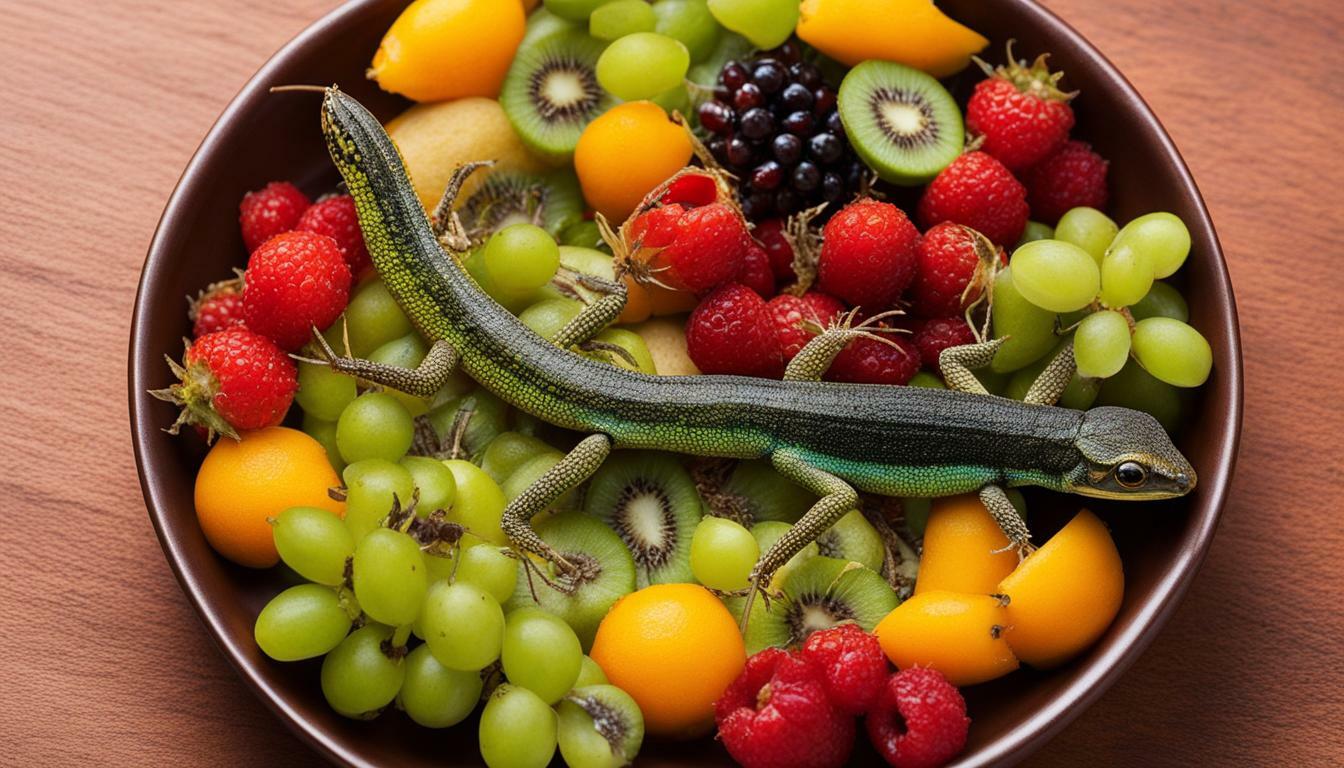Baby lizards have specific dietary needs that must be met to support their growth and development. While they may have the same nutritional requirements as adult lizards, baby lizards may not be as effective at hunting and foraging for food. The diet of a baby lizard depends on its species, with some being herbivores, omnivores, or carnivores. Understanding their dietary requirements is crucial for their overall health and well-being.
Key Takeaways:
- Baby lizards have specific dietary needs that must be met for their growth and development.
- The diet of a baby lizard depends on its species, with some being herbivores, omnivores, or carnivores.
- Wild baby lizards eat various prey such as insects, worms, mice, frogs, and other lizards, as well as local plant life.
- Pet baby lizards can be fed similar foods recommended for adults, such as live crickets, flies, roaches, worms, and rodents.
- Herbivorous baby lizards should be offered a variety of fruits and greens.
- Monitoring feeding sessions and removing uneaten prey after about 20 minutes is important to prevent harm to the lizard.
- Consulting a veterinarian is recommended for proper diet and nutrition tailored to the specific lizard species.
Diet Requirements for Baby Lizards
The diet of a baby lizard largely depends on its species, with some being herbivores, omnivores, or carnivores. Just like adult lizards, baby lizards require a well-balanced diet to support their growth and overall health. If you have a pet baby lizard, it is important to provide them with the appropriate food choices to meet their nutritional needs.
For carnivorous baby lizards, their diet should primarily consist of live prey. This can include crickets, flies, roaches, worms, and even small rodents. These live prey items provide essential proteins and nutrients for their development. You can offer the prey items directly to the lizard and observe their feeding behavior. It is essential to monitor the feeding sessions and remove any uneaten prey after about 20 minutes to prevent potential harm to the lizard.
On the other hand, herbivorous baby lizards thrive on a diet rich in fruits and greens. This includes a variety of leafy vegetables, such as kale, collard greens, and spinach, as well as fruits like strawberries and blueberries. Offering a diverse range of plant-based foods ensures that herbivorous baby lizards receive the necessary vitamins and minerals for their growth.
It is important to note that the nutritional needs of baby lizards can vary depending on their specific species. Consulting a veterinarian who specializes in reptiles can provide you with personalized recommendations tailored to your baby lizard’s diet requirements. A veterinarian can also assess the overall health of your baby lizard and provide guidance on maintaining a proper feeding schedule. Remember, a well-nourished baby lizard is more likely to grow into a healthy and thriving adult.
| Food | Diet Type |
|---|---|
| Crickets, flies, roaches, worms, and rodents | Carnivorous baby lizards |
| Leafy vegetables, fruits | Herbivorous baby lizards |
Table: Recommended food choices for baby lizards based on their diet type.
Consulting a veterinarian who specializes in reptiles can provide you with personalized recommendations tailored to your baby lizard’s diet requirements.
Feeding Baby Lizards
Feeding baby lizards requires careful consideration of their size, age, and species, as well as providing a suitable feeding schedule. Just like adult lizards, baby lizards have specific nutritional needs that must be met to ensure proper growth and development. Whether you have a herbivorous, omnivorous, or carnivorous baby lizard, it’s important to offer them a varied diet that matches their natural feeding habits.
If you have a pet baby lizard, you can feed them the same food recommended for adult lizards. For carnivorous baby lizards, a diet consisting of live prey such as crickets, flies, roaches, worms, and rodents will provide them with the necessary protein. It’s crucial to ensure the prey is an appropriate size for the baby lizard, as they may struggle to consume larger prey. On the other hand, herbivorous baby lizards should have access to a variety of fruits and greens to meet their nutritional requirements.
When feeding baby lizards, it’s important to monitor their feeding sessions. Offer the appropriate amount of food for their size and age, and observe their feeding behavior. Remove any uneaten prey after about 20 minutes to prevent harm to the lizard or the risk of prey escaping and causing potential health issues. Additionally, providing a suitable feeding schedule is essential. Depending on the species, baby lizards may require frequent feedings throughout the day.
To ensure the best care for your baby lizard, it is highly recommended to consult a veterinarian. They can provide you with expert advice and specific diet recommendations tailored to your lizard’s species. A veterinarian will consider factors such as the lizard’s age, size, and health condition to create a well-balanced diet plan that promotes healthy growth and development. Remember, proper nutrition is crucial for the overall well-being and longevity of your baby lizard.
| Species | Diet |
|---|---|
| Carnivorous Baby Lizards | Live prey such as crickets, flies, roaches, worms, and rodents. |
| Herbivorous Baby Lizards | Varied fruits and greens. |
Best Food Choices for Baby Lizards
The optimal food choices for baby lizards include live prey for carnivorous species and a variety of fruits and greens for herbivorous species. Just like adult lizards, baby lizards have specific nutritional needs that must be met to ensure their growth and overall health.
For carnivorous baby lizards, live prey is an essential part of their diet. This includes small insects such as crickets, flies, and roaches. These live prey items provide the necessary protein and nutrients that carnivorous lizards require for proper development. Some larger carnivorous species may even eat small rodents like mice as they grow older.
On the other hand, herbivorous baby lizards need a diet rich in fruits and greens. Offer a variety of leafy greens like kale, collard greens, and dandelion greens. Fruits like berries, melons, and sliced apples can also be provided as a tasty treat. Make sure to thoroughly wash all fruits and vegetables before offering them to the baby lizard to remove any pesticides or contaminants.
It’s important to note that while baby lizards can eat the same food as adult lizards, they may require smaller portions and more frequent meals. Offer food in appropriate sizes for the size of the baby lizard, making sure it can be easily consumed without any risk of choking. Additionally, monitor feeding sessions closely and remove any uneaten prey after about 20 minutes to prevent harm to the lizard and maintain cleanliness in their enclosure.
Table: Recommended Food Choices for Baby Lizards
| Lizard Species | Food Choices |
|---|---|
| Carnivorous | Live prey such as crickets, flies, roaches, worms, and small rodents like mice |
| Herbivorous | Leafy greens like kale, collard greens, dandelion greens, and fruits like berries, melons, sliced apples |
Consultation with a Veterinarian
It is highly recommended to seek professional advice from a veterinarian who specializes in reptile care to ensure that your baby lizard receives the appropriate diet and nutrition for its specific species. A veterinarian will have the expertise and knowledge to assess the nutritional needs of your baby lizard and provide tailored recommendations to support its growth and overall health.
During a consultation, the veterinarian will consider factors such as the species of your baby lizard, its age, size, and activity level. They will also take into account any specific dietary requirements or restrictions that may apply. By conducting a thorough examination and discussing your baby lizard’s health and habits, the veterinarian can determine the best course of action to meet its nutritional needs.
Additionally, a veterinarian can guide you on the proper feeding techniques and frequency for your baby lizard. They can advise on the appropriate portion sizes and how to introduce new foods gradually. This is particularly important for baby lizards transitioning from a specific diet to a broader range of food choices.
Remember, a well-balanced diet is crucial for the development and overall well-being of your baby lizard. Consulting a veterinarian will provide you with the necessary guidance and resources to ensure that your little reptile friend receives the best possible care and nutrition.
| Benefits | Description |
|---|---|
| Expertise | Veterinarians are knowledgeable in reptile nutrition and can provide species-specific recommendations. |
| Individualized Care | A veterinarian will tailor their advice to your baby lizard’s specific needs, taking into account factors such as species, age, and health. |
| Feeding Techniques | Veterinarians can guide you on proper feeding techniques, portion sizes, and how to introduce new foods to your baby lizard’s diet. |
| Preventive Care | Regular check-ups with a veterinarian can help identify any potential health issues early on, ensuring that your baby lizard maintains optimal health through proper nutrition. |
Conclusion
Providing a proper diet is essential for the healthy growth and development of baby lizards, and consulting with a veterinarian can help ensure their specific dietary needs are met. Baby lizards have the same nutritional requirements as adult lizards but may not be as proficient at hunting and foraging for food. Therefore, it is important to provide them with a well-balanced diet that meets their species’ dietary preferences.
Depending on the species, baby lizards can be herbivores, omnivores, or carnivores. If you have a pet baby lizard, you can offer them the same food recommended for adult lizards. For carnivorous lizards, this includes live prey such as crickets, flies, roaches, worms, and even small rodents. Herbivorous baby lizards, on the other hand, should be offered a variety of fruits and greens to meet their nutritional needs.
When feeding baby lizards, it is crucial to monitor their feeding sessions closely. Remove any uneaten prey after about 20 minutes to prevent harm to the lizard and keep their enclosure clean. Additionally, consulting a veterinarian is highly recommended to ensure that you are providing the right diet and nutrition for your specific lizard species. Veterinarians have the expertise to offer tailored recommendations that will support the health and well-being of your baby lizard.
In conclusion, giving baby lizards the proper diet they need is crucial for their growth and overall health. Whether they are herbivores, omnivores, or carnivores, it is important to offer them a balanced diet that meets their specific requirements. Consulting with a veterinarian can provide valuable guidance and ensure that you are providing the best possible nutrition for your baby lizard.
FAQ
Q: What do baby lizards eat?
A: Baby lizards have the same nutritional needs as adult lizards but may not be as effective at hunting and foraging. The diet of a baby lizard depends on its species, with some being herbivores, omnivores, or carnivores. Wild baby lizards eat various prey such as insects, worms, mice, frogs, and other lizards, as well as local plant life.
Q: What should I feed my pet baby lizard?
A: If you have a pet baby lizard, you can feed them the same food recommended for adults, such as live crickets, flies, roaches, worms, and rodents. Herbivorous baby lizards should be offered a variety of fruits and greens.
Q: How often should I feed my baby lizard?
A: It is recommended to feed baby lizards daily, providing them with appropriate portion sizes based on their size and species.
Q: How long should I leave prey in the enclosure?
A: It’s important to monitor feeding sessions and remove any uneaten prey after about 20 minutes to prevent harm to the lizard.
Q: Should I consult a veterinarian for my baby lizard’s diet?
A: Yes, it is recommended to consult your veterinarian for proper diet and nutrition recommendations for your specific lizard species. They can provide expert guidance to ensure your baby lizard’s health and well-being.

